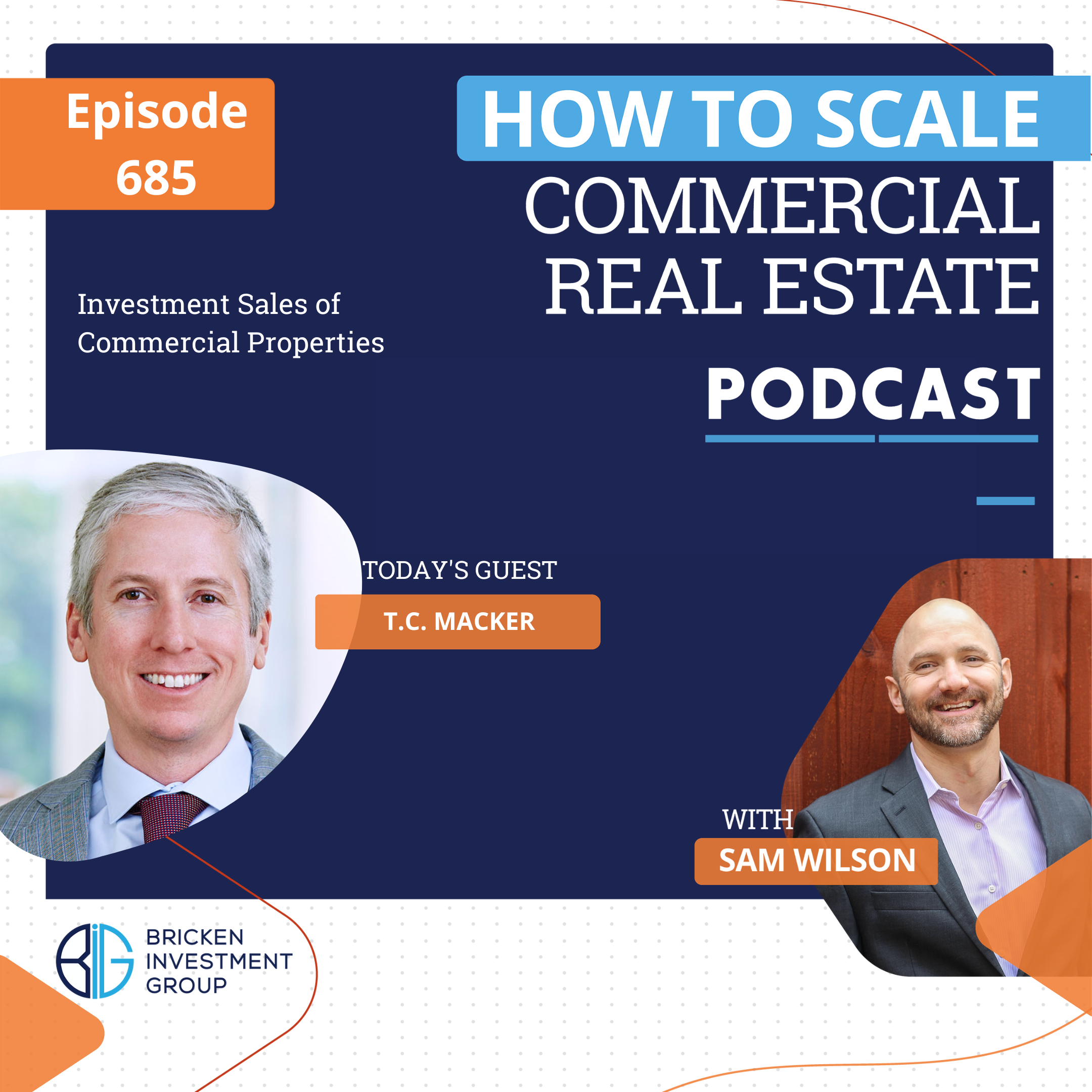

T.C. Macker is the president of WESTMAC commercial Brokerage Company, He started as a tenant tenure rep leasing office buildings in downtown LA, and he then transitioned to focusing on investment sales. Today T.C. is working on selling commercial properties. He selects properties that are interesting and unique.
[00:00 - 05:56] This is why you should always choose a commercial real estate broker who represents sellers.
- Selling a variety of properties in the Los Angeles area, most specifically on the west side
- Representing buyers and sellers equally
- Looking for opportunities to work with clients who are excited about their property and want to sell it quickly
[05:57 - 11:23] How to Sell a Property: Tips from an Expert
- Property sales are not as simple as just putting it on the market and hoping for the best.
- There are many things that need to be taken into account,
-
- Including tax consequences and;
- Zoning restrictions.
- Industrial warehouses are currently one of the most popular types of commercial property to sell, followed by apartments and retail.
- Office buildings are among the most challenging to sell due to the current recession and pandemic.
[11:24 - 17:01] Sellers should consider these key things before selling their property
- The opportunities for selling owner-user buildings, including office buildings, can be repurposed.
- Industrial properties are also still available, but have low cap rates and are hard to find investments in.
- Apartment properties are becoming more affordable as the housing market continues to increase. This will force more people to rent instead of buy."
[17:01 - 20:44] Closing Segment
- Reach out to T.C. Macker!
-
- Links Below
----------------------------------------------------------------------------------
Tweetable Quotes:
“Whenever there's a challenging product type, that's where the opportunity really is.” T.C Macker
Connect with T.C. Macker by following him on Facebook, Instagram, and Linkedin
You can also reach him by Email tcmacker@westmac.com and by Phone (310) 966-4352
You can also visit https://www.westmac.com/ for more information.
Connect with me:
I love helping others place money outside of traditional investments that both diversify a strategy and provide solid predictable returns.
Like, subscribe and leave us a review on Apple Podcasts, Spotify, Google Podcasts, or whatever platform you listen on. Thank you for tuning in!
Email me → sam@brickeninvestmentgroup.com
Want to read the full show notes of the episode? Check it out below:
[00:00:00] TC Macker: people don't know what we really do. And, and I try to tell people , it's complex to sell a property. It's not like, Hey, you just stick it on the market and good luck, right? I mean, you really have to know what you're doing.
If you want to ensure that you go from A to Z and hopefully avoid as many hiccups as possible you know, people can get lucky. But if you wanna be continuously successful you better have a plan.
[00:00:31] Sam Wilson: TC Macker is an investment sales broker specializing in commercial properties in Los Angeles. Tc, Welcome to the show.
[00:00:38] TC Macker: Thank you for having me, Sam. I appreciate
[00:00:40] Sam Wilson: it. Absolutely. Tc, there are three questions I ask every guest who comes into the show in 90 seconds or less. You tell me where did you start?
Where are you now and how did you get there?
[00:00:48] TC Macker: Oh, good question. Well, I I guess it's in the genes. My dad Tim Macker was a, a real estate commercial real estate broker in Los Angeles. and I guess I was the kid of the family that decided to go into the family business. So, always wanted to do what my dad did.
I never knew really what he did. I didn't know what commercial real estate even really meant even up, even up through college. So, my dad was pretty good about separating, his business life and family life. But nevertheless, after I graduated college, Boston College, I came back and, and jumped right.
Did started as tenant tenure rep leasing of office buildings in downtown Los Angeles. And today, Where are you? So I, I transitioned over time. I didn't, you know, when you jump into real estate, there's so many, you don't realize how many choices you have. You know, is it industrial? Is it retail? Is it office?
Is it investment sales? Is it leasing? Is it self storage? Is it hotels? Is it golf courses? ultimately I moved from 10 rep leasing and of high rise billions in downtown Los Angeles to really focusing on investment sales. So selling. Commercial properties mostly on the side of the seller. Hmm.
And really focusing my business on that.
[00:02:00] Sam Wilson: Got it. Got it. Tell me, so what, what are some things today, like, what are, what are some properties you've, that, that you're working on today that you'd say, Hey, you know, this is, this is an asset that I think is really fun that I'm working on, or, Here's a unique deal that, that we're putting together right now.
[00:02:19] TC Macker: You know, we sort of, it, it, it, it's interesting and that's why I sort of selected this focus. , it's because I sell properties that could be as small as, as $2 million. And like I'm selling a pet hospital right now, where I'm representing this, this family that's owned this pet hospital for 30 years and they're finally retiring.
very nice people and. I'm excited to represent their interest and we're selling to another pet hospital operator. So I'm doing that. And then on the other end of the spectrum, I'm, I'm selling a development site in Santa Monica, California. That's a very prominent site that. Where you could build 150 units and that's gonna go for something in the 30 million range.
So, and I sell everything in between and some things that are even more so. But most of the stuff I sell is, is localized to. The LA market and more specifically, most of the stuff I sell is in the, on the west side, which is you know, sort of the Manhattan of, of California or of
[00:03:18] Sam Wilson: Los Angeles. Got it.
And so you represent almost exclusively on the, on the seller, is that correct? That's correct. That's correct. And how does that Every once in a while I'll sell yeah, go ahead. Sorry. Well, how does that differ, I guess, because I'm, I, I'm not a, not a commercial real estate broker per se, so how does that differ, you know, from somebody, I guess that has a, a book of investors break, break the difference down, and why is it important?
[00:03:44] TC Macker: Well, good question. And there's certainly people that are successful representing certain investors and certain buyers. Again, it's all about your client relationships that you make. I chose to represent sellers because I look at it, I like the seller's side. I like working with the property owner.
Mm. I like the marketing aspect. And I also look at it as you know, if you're on the seller side, then all the buyers and buyers brokers are coming to you. If you're on the buyer broker side, then in many cases you have one shot or you're competing against other buyer brokers and other investors.
So I thought for my business, for me I was more excited to be on the seller.
[00:04:24] Sam Wilson: What, what do you feel like are things there? What, what are some common things that you tell every client that you work with that helps them get their properties moved at the price they want?
[00:04:36] TC Macker: That's a good question. That's a hard question. because sometimes, obviously I can't predict what the market will bear. Sure. I do tell them that, that my goal, is to. expose the property to as many investors and, buyers brokers as possible, and to also make the offering as as possible.
So I, you know, I emphasize that with every single investment we put on the market, that we do it right, everything's approved by the client we make sure everything's professionally done with high quality professional photos, every property. So I have a. I have in my office a, a we created a if you're familiar with contracting, the Gantt chart, G a n t t chart.
So if you're putting together a door and you give it to a contractor and the workman, they can go through and put the door in the jam and properly connect it. And it's very, very detailed. And so we took a Gant chart and applied it to commercial real estate and went through and actually have a big. Board over my office.
I'm happy to hold it up with all the responsibilities and items that, the ingredients, so to speak to successfully sell a property from the pre-marketing to the marketing for the postmarketing. And, and then we also, and we also then assign tasks to, you know, some are seller tasks, some are broker tasks, some are lender tasks, some are buyer tasks.
Some are title tasks, some are escrow tasks. So each thing is itemized. Cause a lot of people don't know what we really do. And, and I try to tell people it's, it's complex to sell a property. It's not like, Hey, you just stick it on the market and good luck, right? I mean, you really have to know what you're doing.
If you want to ensure that you go from A to Z and hopefully avoid as many hiccups as possible you know, people can get lucky. But if you want to continue, if you wanna be continuously successful you better have a plan.
[00:06:22] Sam Wilson: Absolutely. What are some things that you feel like are on that chart you've made that would be surprising to our listeners?
[00:06:31] TC Macker: I think a lot of it is the, you know, a lot of people sort of have an idea, if you're a late person, as to, how a property is sold cuz they sold their house or they bought a house before. . I think what's a little bit different when you're looking at selling a, a commercial properties is lot of things I would say in the chart that are in the pre-marketing and the postmarketing that people don't think about.
You know, for example, in the post marketing, if you sold a property and you paid a million dollars for it, now it's worth 10. That's great, but now you have, if you haven't thought about the tax consequence, that can be, that can become a big problem. Cause you're, you're, you know, in California, with California state and Fed tax, you're gonna give away about 33.3%.
To the government unless you decided to do a 10 31 exchange. So, a lot of people don't think about the 10 31 exchange until they're already in escrow, and we try to get out in front of those items with, with our clients. And we talked about it initially at the first meeting, you know, Hey, what are you gonna do with the proceeds?
And some people may wanna go by, you know, sell out in the sunset and move to Hawaii, that's fine. But others don't understand all the complexities of, of what happens after you sell a property.
[00:07:43] Sam Wilson: I think that's really fascinating Yeah. To get, to get that out in the front. And those aren't things I think about from the sell side because I'm on the buy side typically, you know, which is, what are you gonna do with those proceeds?
Of course, you know, we have those conversations later on with most seller. If, if it's a direct a buyer or direct a seller for us, cuz I wanna find out if there's owner financing available or at least if they'll carry some of it. But you know, for you, getting, getting that out, out, out right in the beginning is probably super super valuable to your clients.
What are. What are some things, I guess, are there certain property types? I know you, you're dealing with everything from a pet hospital, which I'm really curious what's interesting about pet hospital and a veterinarian. Like, I don't, maybe I don't have enough experience with pets, but what's the difference, just pure curiosity.
[00:08:27] TC Macker: That's a good question. You know, I, I guess it's just another way, you know, a vet clinic versus a pet hospital, they're very similar. Our zoning is, North California, we have just every, they make it challenging on us, so everything's put in a particular box. So, you know, and they only allow certain uses within certain areas.
So it, it's a classification.
[00:08:49] Sam Wilson: Got it, got it. Okay, cool. So I guess when you, when you, when you looking at all these different properties, is there, is there one that's moving more than another? Is. Opportunity that you're, and again, I know you, you represent the sellers, but where do you see the most opportunity for investors?
Cuz obviously you need both. So is there, is there one in particular that stands out to you right now as a great, a great opportunity or even a good opportunity to sell if you're a seller? Is, I mean, you know, is there a certain asset type? You said, man, right now is a great time to put what you own on
[00:09:22] TC Macker: the market.
Two questions. I mean, you know, that's a question that I'm asked. Daily. And you know, I, I think right now with where we are, you know, if we're in a recession or not, certainly the darlings right now of types for commercial real estate seem to be industrial warehouses. I would say is number one.
I would say a close number two would be apartments. And then there's a big gap. And the next one down I would say would be retail. And it's certain kinds of retail that don't necessarily eat with, you know, the internet, so, you know, soft goods or challenging, but maybe, you know, restaurants or obviously people still need to go to restaurants and those type of things.
And then I would say a distant fourth, the major food groups. For commercial real estate investment would be office buildings. And I'd say office buildings right now are, are the most challenged because, because of this sort of the pandemic is, is put a lot of people sort of in limbo as to what they want to do.
Are they gonna go back to the office? Are they gonna go a couple days a week? Are they gonna have half their employees come in? And we see this at, with every business at least in Los Angeles, where you see. Go look at the, you know, parking garages or the, or the parking lots. You'll see, you don't see a hundred percent full parking lots anymore.
You see 40, 50% at best. And that seems to be a theme. And so there's a reshuffling of office space, you know, at, you know, before the pandemic. We were trying to put as many people as possible in one. and, in these sort of creative open full pen type spaces. And now with the, pandemic and now we're going back to maybe more, you know, keeping people apart from one another.
So, we'll see, We'll see. So office buildings, I think are, are very challenged right now. You know, obviously there are some anomalies, you know, owner user office buildings seem to be in demand and we saw a lot of those. So that's someone that's renting right now that, Besides, they wanna own a own, own their own building.
And you can get SBA loans are still plentiful. Although the loans have been, you know, rates have been creeping up it still can make a lot of sense for the right investor. So we are selling owner user buildings. We're still selling office buildings, but it's certainly a challenged product type now where there's opportunity.
Look, whenever there's a challenged product type, that's, that's where the opportunity really is. You know, can you take that office building and repurpose it? Can you, you know, for something else, maybe it becomes, We've had an, we had an office building in our market. Go from you know, Eighties office billings that were ripped down are now distribution center for Amazon.
So, that can happen. Obviously some other office billings are being torn down for housing. Some office billings re repurposed as housing, as apartment S, so it's ever changing. So that, that is opportunity. And I think with industrial, even though it's, in, in highest demand, there's still opportunity there too cuz there's only a limited supply of it.
So yes, cap rates are low. Yes, it's hard to find investments in the industrial area, but if you can, it's, it'll probably be a long, a good long term hold. And then an apartment says, as at the affordability of homes continues to, to increase. I mean, it, it just, it's LA is a crazy place to own a house cuz it just, Now, now the, the housing, the houses are a million dollars and up for the, for the least expensive house.
So how many people can afford that? And that's gonna force especially with the interest rates coming up, that's gonna force more people to be renters. So apartments, I think will continue to see the benefit of that sort of push, if that makes.
[00:12:48] Sam Wilson: Yeah, certainly it does. Yeah. What did I get a, I got an email today, it was a 30 year, I get, it's just a weekly staff shot that comes out and it was a 30 year fixed mortgage residential, of course.
And it came out, it was like 6.875 was , the rate being quoted the day. And it was like another point, another quarter or 0.2 or 20, 25 basis points for a refile and that. I'm like, Wow, you. We're now in the sevens on and imagine about a million dollar, million dollar acquisition. That's, that's a lot for for the average American to to swallow.
On a on an annual basis. So that's very, very interesting. Tell me this, you know, preparation when you, you know, obviously one of the things you said initially, we talked about this a few minutes ago, is that you asked me what are they gonna do with the proceeds are gonna 10 31 at, what are some other key things that you would recommend to sellers as they think about and prepare to sell their buildings?
[00:13:43] TC Macker: Good questions. Cuz there's a lot of, a lot of things you have to think about. Most people don't think about such as if you're thinking about selling your property you know, simple things like going through and, and curing, you know, deferred maintenance. Looking at, you know, pulling a title report on your, on your property and making sure you clean up the, the title in case there's, you know, certain things that shouldn't be on the title that need to be fixed, like old loans or.
Things that have been you know, easements and other things that you can cure prior, prior to putting on the market. Also, if you're doing a 10 31 exchange, and let's just say you and I own a property together and we hold it as an llc, one llc, it would be, best for us to do a rollout into a tenant in common situation.
So, You and I have separate interests. We did that before we put the property on the market and that way we can both go our own separate ways and I can do it 10 31 and you may not, or vice versa. Or we might both do 10 30 ones, but that way we can separate our interest and go our separate ways.
Versus if we keep it as that same entity, then we'd have to move our money together and go together. So I see that all the time. You know, I sold a property last year and I think we had 17 different owners. And so before we put the property in the market, we had to make sure we got all that. You know, properly documented so that everybody could do what they wanted with their proceeds.
What, Those are things that people don't usually think, think about.
[00:15:14] Sam Wilson: No, certainly they don't. And what was the time, I'm just really curious from a personal point of view, how much time does it typically take for people to go from that LLC to tick structure? Is that planning that out? 30 days, 60 days? I mean, what's the look?
It could be done
[00:15:32] TC Macker: quickly in terms of a quick claim deed. The The issue is more about the you know, talking to your accountant. So I, I always recommend people talk to their CPA accountant or tax attorney or both because different accountants and different tax attorneys have different interpretations of, of what, how they sort of season the rolling out.
So some people think that that it's best to do the rollout a year in advance of selling your. some people have done it in escrow. obviously the, the goal is to not get, you know, flagged by the IRS until you, and, and you don't want your 10 31 to be invalidated, right? So that's the goal. But different people have different interpretations, so it, it is good to think about these things ahead of time, if you
[00:16:14] Sam Wilson: can.
Yeah, absolutely. Absolutely. Anything else come to mind that you said, you know, these are, these are some things that sellers should really be considering that, you know, you commonly see people overlook?
[00:16:25] TC Macker: Well, I think also looking at your, you know, your tenant mix, depending on if you have tenants or not.
You know, do you have any issues with your tenants that you can. fix ahead of time. I mean, by that, if you, there's some kind of improvement that hasn't been done or you know, there's some option coming up. Obviously you want to, you, you wanna make your rent roll as attractive as possible, you know, you get more.
more, of a multiple, depending on your multiple will be bigger. If you have a better income, or excuse me, you have better income. If you have a better income, you're gonna have a. A better purchase price based on the multiple. So you wanna make sure your income is, you know, as best as possible.
So, you know, if there's tenant leases coming up, maybe you renew them, maybe you don't depending on the situation.
[00:17:06] Sam Wilson: I, I like that idea of making your rent role attractive. Because that is, that's probably something that, you know, if you're thinking about selling, maybe, you know, you hadn't considered was going, Okay, lock in your tenants in, in longer term leases if possible.
I mean, get 'em, get 'em. I would think, I would think that that would add value to the property going, Okay, hey, you know what? Maybe you're up for renewal. Let's go ahead and get a five. Get some, Get some built in. Built in increases in there, and go ahead and make sure that you're gonna be here for a while.
And as many of those as you can lock up on your property, I would imagine would only increase the value of it.
[00:17:40] TC Macker: That's true that there's situations where I advise the opposite if it's an owner user property. So if a property has a short term month to Montana, let's say, and the property is gonna sell pro, you know, the probable buyer is a user, then I would say don't touch the tenant.
Leave em b. But yes, most of the time it's, can we look at our rent roll and make, you know, cuz if you're buying as a pure investment, then the, the, depending on who the, the buyer is a lot of them wanna see a staggered rent role and they want to, they don't want how all the leases coming up in the same day.
And they would like, you know, something as, you know, it's all, it's all risk. All based on risk. So when you look at cap rates, if you buy a McDonald's with a 20 year lease, they sell it a three and a half, 4% cap rate. And there's a reason for it. It's because it's, hopefully you don't have to do anything
Hopefully you're just collecting mailbox money. versus, versus if I've got a mom and pop tenant, you know, vet hospital, let's say you know, are those people gonna be in business in three years, five years? I. So in the cap rate, it'll be adjusted accordingly. So it's just something to look at with each property.
[00:18:48] Sam Wilson: Right? Absolutely. Love Ittc, you've given us a lot of things here to think about from the sell side. You know, as, as we consider selling properties, as you talked about, you know, looking at what it means to get our properties ready, making rent roll, attractive, thinking about zoning, you know, a lot of things that probably I don't think about as often because again, you know, we're mostly buyers.
So it's I think it's really, really interesting to get perspective from you on what it's like to represent commercial property owners almost exclusively on the on the sell side. If our listeners wanna get in touch with you or learn more about you, what is the best way to do that? So,
[00:19:25] TC Macker: you can follow me on social media.
I'm pretty active. I have my handle, is. West LA CRE on Instagram. You can also find me on LinkedIn, TC Macker, T period C, period. Macker, M A C K R. The T is for Timothy, the C is for Christopher. I go by T.C. My parents did that to me. So TC Macker on LinkedIn. I'm also on Instagram. Also Facebook.
You can also reach me the old school way. My telephone number is (310) 966-4352 or by email T.C Macker West Mac, W e s t m a c . com
[00:20:07] Sam Wilson: Awesome tc, thank you for coming on the show today. Certainly appreciate it and have a great rest of your afternoon and one include all of those links there in the show notes as well.
So thanks again. Appreciate it,
[00:20:18] TC Macker: Sam, thanks for having me. I really appreciate it.
Connect with me:
I love helping others place money outside of traditional investments that both diversify a strategy and provide solid predictable returns.
Like, subscribe, and leave us a review on Apple Podcasts, Spotify, Google Podcasts, or whatever platform you listen on. Thank you for tuning in!
Email me → sam@brickeninvestmentgroup.com
Want to read the full show notes of the episode? Check it out below:
[00:00:00] TC Macker: people don't know what we really do. And, and I try to tell people , it's complex to sell a property. It's not like, Hey, you just stick it on the market and good luck, right? I mean, you really have to know what you're doing.
If you want to ensure that you go from A to Z and hopefully avoid as many hiccups as possible you know, people can get lucky. But if you wanna be continuously successful you better have a plan.
[00:00:31] Sam Wilson: TC Macker is an investment sales broker specializing in commercial properties in Los Angeles. Tc, Welcome to the show.
[00:00:38] TC Macker: Thank you for having me, Sam. I appreciate
[00:00:40] Sam Wilson: it. Absolutely. Tc, there are three questions I ask every guest who comes in the show in 90 seconds or less. You tell me where did you start?
Where are you now and how did you get there?
[00:00:48] TC Macker: Oh, good question. Well, I I guess it's in the genes. My dad Tim Macker was a, a real estate commercial real estate broker in Los Angeles. and I guess I was the kid of the family that decided to go into the family business. So, always wanted to do what my dad did.
I never knew really what he did. I didn't know what commercial real estate even really meant even up, even up through through college. So, my dad was pretty good about separating his, his business life and family life. But nevertheless, after I graduated college, Boston College, I came back and, and jumped right.
Did started in tenant tenure rep leasing of office buildings in downtown Los Angeles. And today, Where are you? So I, I transitioned over time. I didn't, you know, when you jump into real estate, there's so many, you don't realize how many choices you have. You know, is it industrial? Is it retail? Is it office?
Is it investment sales? Is it leasing? Is it self storage? Is it hotels? Is it golf courses? ultimately I moved from 10 rep leasing and of high rise billions in downtown Los Angeles to really focusing on investment sales. So selling. Commercial properties mostly on the side of the seller. Hmm.
And really focusing my business on that.
[00:02:00] Sam Wilson: Got it. Got it. Tell me, so what, what are some things today, like, what are, what are some properties you've, that, that you're working on today that you'd say, Hey, you know, this is, this is an asset that I think is really fun that I'm working on, or, Here's a unique deal that, that we're putting together right now.
[00:02:19] TC Macker: You know, we sort of, it, it, it, it's interesting and that's why I sort of selected this focus. , it's because I sell properties that could be as small as, as $2 million. And like I'm selling a pet hospital right now, where I'm representing this, this family that's owned this pet hospital for 30 years and they're finally retiring.
very nice people and. I'm excited to represent their interest and we're selling to another pet hospital operator. So I'm doing that. And then on the other end of the spectrum, I'm, I'm selling a development site in Santa Monica, California. That's a very prominent site that. Where you could build 150 units and that's gonna go for something in the 30 million range.
So, and I sell everything in between and some things that are even more so. But most of the stuff I sell is, is localized to. The LA market and more specifically, most of the stuff I sell is in the, on the west side, which is you know, sort of the Manhattan of, of California or of
[00:03:18] Sam Wilson: Los Angeles. Got it.
And so you represent almost exclusively on the, on the seller, is that correct? That's correct. That's correct. And how does that Every once in a while I'll sell yeah, go ahead. Sorry. Well, how does that differ, I guess, because I'm, I, I'm not a, not a commercial real estate broker per se, so how does that differ, you know, from somebody, I guess that has a, a book of investors break, break the difference down, and why is it important?
[00:03:44] TC Macker: Well, good question. And there's certainly people that are successful representing certain investors and certain buyers. Again, it's all about your client relationships that you make. I chose to represent sellers because I look at it, I like the seller's side. I like working with the property owner.
Mm. I like the marketing aspect. And I also look at it as you know, if you're on the seller side, then all the buyers and buyers brokers are coming to you. If you're on the buyer broker side, then in many cases you have one shot or you're competing against other buyer brokers and other investors.
So I thought for my business, for me I was more excited to be on the seller.
[00:04:24] Sam Wilson: What, what do you feel like are things there? What, what are some common things that you tell every client that you work with that helps them get their properties moved at the price they want?
[00:04:36] TC Macker: That's a good question. That's a hard question. because sometimes, obviously I can't predict what the market will bear. Sure. I do tell them that, that my goal, is to. expose the property to as many investors and, buyers brokers as possible, and to also make the offering as as possible.
So I, you know, I emphasize that with every single investment we put on the market, that we do it right, everything's approved by the client we make sure everything's professionally done with high quality professional photos, every property. So I have a. I have in my office a, a we created a if you're familiar with contracting, the Gantt chart, G a n t t chart.
So if you're putting together a door and you give it to a contractor and the workman, they can go through and put the door in the jam and properly connect it. And it's very, very detailed. And so we took a Gant chart and applied it to commercial real estate and went through and actually have a big. Board over my office.
I'm happy to hold it up with all the responsibilities and items that, the ingredients, so to speak to successfully sell a property from the pre-marketing to the marketing for the postmarketing. And, and then we also, and we also then assign tasks to, you know, some are seller tasks, some are broker tasks, some are lender tasks, some are buyer tasks.
Some are title tasks, some are escrow tasks. So each thing is itemized. Cause a lot of people don't know what we really do. And, and I try to tell people it's, it's complex to sell a property. It's not like, Hey, you just stick it on the market and good luck, right? I mean, you really have to know what you're doing.
If you want to ensure that you go from A to Z and hopefully avoid as many hiccups as possible you know, people can get lucky. But if you want to continue, if you wanna be continuously successful you better have a plan.
[00:06:22] Sam Wilson: Absolutely. What are some things that you feel like are on that chart you've made that would be surprising to our listeners?
[00:06:31] TC Macker: I think a lot of it is the, you know, a lot of people sort of have an idea, if you're a late person, as to, how a property is sold cuz they sold their house or they bought a house before. . I think what's a little bit different when you're looking at selling a, a commercial properties is lot of things I would say in the chart that are in the pre-marketing and the postmarketing that people don't think about.
You know, for example, in the post marketing, if you sold a property and you paid a million dollars for it, now it's worth 10. That's great, but now you have, if you haven't thought about the tax consequence, that can be, that can become a big problem. Cause you're, you're, you know, in California, with California state and Fed tax, you're gonna give away about 33.3%.
To the government unless you decided to do a 10 31 exchange. So, a lot of people don't think about the 10 31 exchange until they're already in escrow, and we try to get out in front of those items with, with our clients. And we talked about it initially at the first meeting, you know, Hey, what are you gonna do with the proceeds?
And some people may wanna go by, you know, sell out in the sunset and move to Hawaii, that's fine. But others don't understand all the complexities of, of what happens after you sell a property.
[00:07:43] Sam Wilson: I think that's really fascinating Yeah. To get, to get that out in the front. And those aren't things I think about from the sell side because I'm on the buy side typically, you know, which is, what are you gonna do with those proceeds?
Of course, you know, we have those conversations later on with most seller. If, if it's a direct a buyer or direct a seller for us, cuz I wanna find out if there's owner financing available or at least if they'll carry some of it. But you know, for you, getting, getting that out, out, out right in the beginning is probably super super valuable to your clients.
What are. What are some things, I guess, are there certain property types? I know you, you're dealing with everything from a pet hospital, which I'm really curious what's interesting about pet hospital and a veterinarian. Like, I don't, maybe I don't have enough experience with pets, but what's the difference, just pure curiosity.
[00:08:27] TC Macker: That's a good question. You know, I, I guess it's just another way, you know, a vet clinic versus a pet hospital, they're very similar. Our zoning is, North California, we have just every, they make it challenging on us, so everything's put in a particular box. So, you know, and they only allow certain uses within certain areas.
So it, it's a classification.
[00:08:49] Sam Wilson: Got it, got it. Okay, cool. So I guess when you, when you, when you looking at all these different properties, is there, is there one that's moving more than another? Is. Opportunity that you're, and again, I know you, you represent the sellers, but where do you see the most opportunity for investors?
Cuz obviously you need both. So is there, is there one in particular that stands out to you right now as a great, a great opportunity or even a good opportunity to sell if you're a seller? Is, I mean, you know, is there a certain asset type? You said, man, right now is a great time to put what you own on
[00:09:22] TC Macker: the market.
Two questions. I mean, you know, that's a question that I'm asked. Daily. And you know, I, I think right now with where we are, you know, if we're in a recession or not, certainly the darlings right now of types for commercial real estate seem to be industrial warehouses. I would say is number one.
I would say a close number two would be apartments. And then there's a big gap. And the next one down I would say would be retail. And it's certain kinds of retail that don't necessarily eat with, you know, the internet, so, you know, soft goods or challenging, but maybe, you know, restaurants or obviously people still need to go to restaurants and those type of things.
And then I would say a distant fourth, the major food groups. For commercial real estate investment would be office buildings. And I'd say office buildings right now are, are the most challenged because, because of this sort of the pandemic is, is put a lot of people sort of in limbo as to what they want to do.
Are they gonna go back to the office? Are they gonna go a couple days a week? Are they gonna have half their employees come in? And we see this at, with every business at least in Los Angeles, where you see. Go look at the, you know, parking garages or the, or the parking lots. You'll see, you don't see a hundred percent full parking lots anymore.
You see 40, 50% at best. And that seems to be a theme. And so there's a reshuffling of office space, you know, at, you know, before the pandemic. We were trying to put as many people as possible in one. and, in these sort of creative open full pen type spaces. And now with the, pandemic and now we're going back to maybe more, you know, keeping people apart from one another.
So, we'll see, We'll see. So office buildings, I think are, are very challenged right now. You know, obviously there are some anomalies, you know, owner user office buildings seem to be in demand and we saw a lot of those. So that's someone that's renting right now that, Besides, they wanna own a own, own their own building.
And you can get SBA loans are still plentiful. Although the loans have been, you know, rates have been creeping up it still can make a lot of sense for the right investor. So we are selling owner user buildings. We're still selling office buildings, but it's certainly a challenged product type now where there's opportunity.
Look, whenever there's a challenged product type, that's, that's where the opportunity really is. You know, can you take that office building and repurpose it? Can you, you know, for something else, maybe it becomes, We've had an, we had an office building in our market. Go from you know, Eighties office billings that were ripped down are now distribution center for Amazon.
So, that can happen. Obviously some other office billings are being torn down for housing. Some office billings re repurposed as housing, as apartment S, so it's ever changing. So that, that is opportunity. And I think with industrial, even though it's, in, in highest demand, there's still opportunity there too cuz there's only a limited supply of it.
So yes, cap rates are low. Yes, it's hard to find investments in the industrial area, but if you can, it's, it'll probably be a long, a good long term hold. And then an apartment says, as at the affordability of homes continues to, to increase. I mean, it, it just, it's LA is a crazy place to own a house cuz it just, Now, now the, the housing, the houses are a million dollars and up for the, for the least expensive house.
So how many people can afford that? And that's gonna force especially with the interest rates coming up, that's gonna force more people to be renters. So apartments, I think will continue to see the benefit of that sort of push, if that makes.
[00:12:48] Sam Wilson: Yeah, certainly it does. Yeah. What did I get a, I got an email today, it was a 30 year, I get, it's just a weekly staff shot that comes out and it was a 30 year fixed mortgage residential, of course.
And it came out, it was like 6.875 was , the rate being quoted the day. And it was like another point, another quarter or 0.2 or 20, 25 basis points for a refile and that. I'm like, Wow, you. We're now in the sevens on and imagine about a million dollar, million dollar acquisition. That's, that's a lot for for the average American to to swallow.
On a on an annual basis. So that's very, very interesting. Tell me this, you know, preparation when you, you know, obviously one of the things you said initially, we talked about this a few minutes ago, is that you asked me what are they gonna do with the proceeds are gonna 10 31 at, what are some other key things that you would recommend to sellers as they think about and prepare to sell their buildings?
[00:13:43] TC Macker: Good questions. Cuz there's a lot of, a lot of things you have to think about. Most people don't think about such as if you're thinking about selling your property you know, simple things like going through and, and curing, you know, deferred maintenance. Looking at, you know, pulling a title report on your, on your property and making sure you clean up the, the title in case there's, you know, certain things that shouldn't be on the title that need to be fixed, like old loans or.
Things that have been you know, easements and other things that you can cure prior, prior to putting on the market. Also, if you're doing a 10 31 exchange, and let's just say you and I own a property together and we hold it as an llc, one llc, it would be, best for us to do a rollout into a tenant in common situation.
So, You and I have separate interests. We did that before we put the property on the market and that way we can both go our own separate ways and I can do it 10 31 and you may not, or vice versa. Or we might both do 10 30 ones, but that way we can separate our interest and go our separate ways.
Versus if we keep it as that same entity, then we'd have to move our money together and go together. So I see that all the time. You know, I sold a property last year and I think we had 17 different owners. And so before we put the property in the market, we had to make sure we got all that. You know, properly documented so that everybody could do what they wanted with their proceeds.
What, Those are things that people don't usually think, think about.
[00:15:14] Sam Wilson: No, certainly they don't. And what was the time, I'm just really curious from a personal point of view, how much time does it typically take for people to go from that LLC to tick structure? Is that planning that out? 30 days, 60 days? I mean, what's the look?
It could be done
[00:15:32] TC Macker: quickly in terms of a quick claim deed. The The issue is more about the you know, talking to your accountant. So I, I always recommend people talk to their CPA accountant or tax attorney or both because different accountants and different tax attorneys have different interpretations of, of what, how they sort of season the rolling out.
So some people think that that it's best to do the rollout a year in advance of selling your. some people have done it in escrow. obviously the, the goal is to not get, you know, flagged by the IRS until you, and, and you don't want your 10 31 to be invalidated, right? So that's the goal. But different people have different interpretations, so it, it is good to think about these things ahead of time, if you
[00:16:14] Sam Wilson: can.
Yeah, absolutely. Absolutely. Anything else come to mind that you said, you know, these are, these are some things that sellers should really be considering that, you know, you commonly see people overlook?
[00:16:25] TC Macker: Well, I think also looking at your, you know, your tenant mix, depending on if you have tenants or not.
You know, do you have any issues with your tenants that you can. fix ahead of time. I mean, by that, if you, there's some kind of improvement that hasn't been done or you know, there's some option coming up. Obviously you want to, you, you wanna make your rent roll as attractive as possible, you know, you get more.
more, of a multiple, depending on your multiple will be bigger. If you have a better income, or excuse me, you have better income. If you have a better income, you're gonna have a. A better purchase price based on the multiple. So you wanna make sure your income is, you know, as best as possible.
So, you know, if there's tenant leases coming up, maybe you renew them, maybe you don't depending on the situation.
[00:17:06] Sam Wilson: I, I like that idea of making your rent role attractive. Because that is, that's probably something that, you know, if you're thinking about selling, maybe, you know, you hadn't considered was going, Okay, lock in your tenants in, in longer term leases if possible.
I mean, get 'em, get 'em. I would think, I would think that that would add value to the property going, Okay, hey, you know what? Maybe you're up for renewal. Let's go ahead and get a five. Get some, Get some built in. Built in increases in there, and go ahead and make sure that you're gonna be here for a while.
And as many of those as you can lock up on your property, I would imagine would only increase the value of it.
[00:17:40] TC Macker: That's true that there's situations where I advise the opposite if it's an owner user property. So if a property has a short term month to Montana, let's say, and the property is gonna sell pro, you know, the probable buyer is a user, then I would say don't touch the tenant.
Leave em b. But yes, most of the time it's, can we look at our rent roll and make, you know, cuz if you're buying as a pure investment, then the, the, depending on who the, the buyer is a lot of them wanna see a staggered rent role and they want to, they don't want how all the leases coming up in the same day.
And they would like, you know, something as, you know, it's all, it's all risk. All based on risk. So when you look at cap rates, if you buy a McDonald's with a 20 year lease, they sell it a three and a half, 4% cap rate. And there's a reason for it. It's because it's, hopefully you don't have to do anything
Hopefully you're just collecting mailbox money. versus, versus if I've got a mom and pop tenant, you know, vet hospital, let's say you know, are those people gonna be in business in three years, five years? I. So in the cap rate, it'll be adjusted accordingly. So it's just something to look at with each property.
[00:18:48] Sam Wilson: Right? Absolutely. Love Ittc, you've given us a lot of things here to think about from the sell side. You know, as, as we consider selling properties, as you talked about, you know, looking at what it means to get our properties ready, making rent roll, attractive, thinking about zoning, you know, a lot of things that probably I don't think about as often because again, you know, we're mostly buyers.
So it's I think it's really, really interesting to get perspective from you on what it's like to represent commercial property owners almost exclusively on the on the sell side. If our listeners wanna get in touch with you or learn more about you, what is the best way to do that? So,
[00:19:25] TC Macker: you can follow me on social media.
I'm pretty active. I have my handle, is. West LA CRE on Instagram. You can also find me on LinkedIn, TC Macker, T period C, period. Macker, M A C K R. The T is for Timothy, the C is for Christopher. I go by T.C. My parents did that to me. So TC Macker on LinkedIn. I'm also on Instagram. Also Facebook.
You can also reach me the old school way. My telephone number is (310) 966-4352 or by email T.C Macker West Mac, W e s t m a c . com
[00:20:07] Sam Wilson: Awesome TC! thank you for coming on the show today. Certainly appreciate it and have a great rest of your afternoon include all of those links there in the show notes as well.
So thanks again. Appreciate it,
[00:20:18] TC Macker: Sam, thanks for having me. I really appreciate it.
More Episodes
All Episodes>>Create Your Podcast In Minutes
- Full-featured podcast site
- Unlimited storage and bandwidth
- Comprehensive podcast stats
- Distribute to Apple Podcasts, Spotify, and more
- Make money with your podcast












